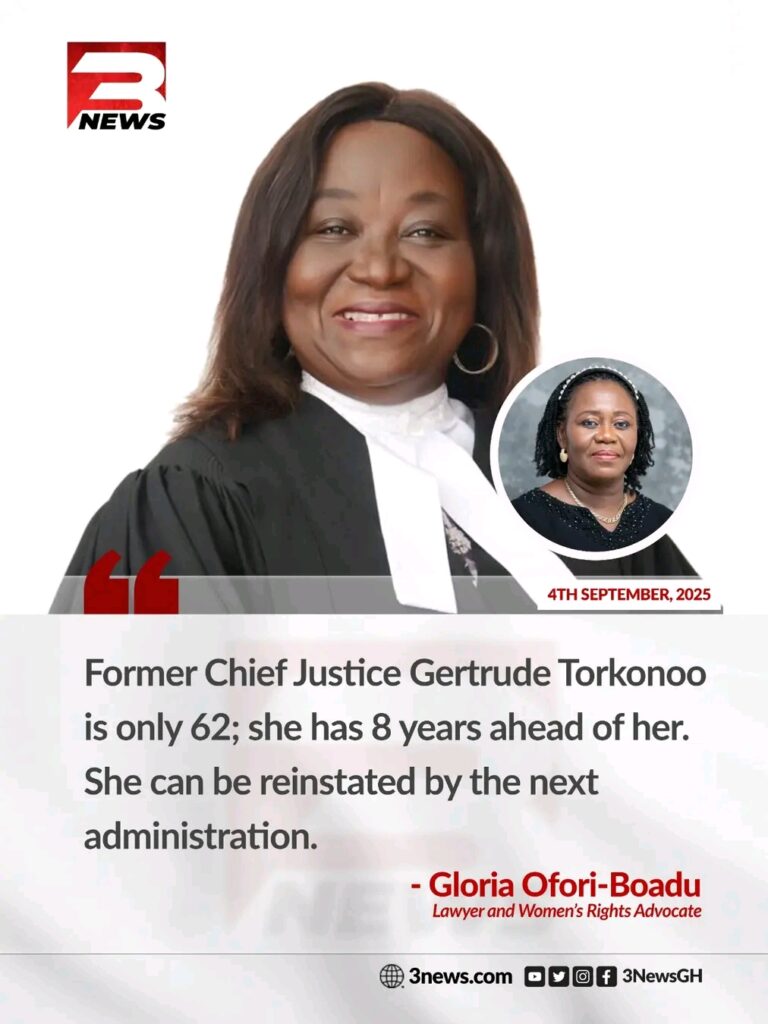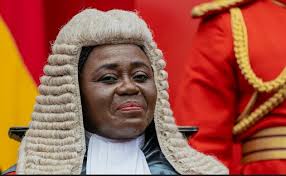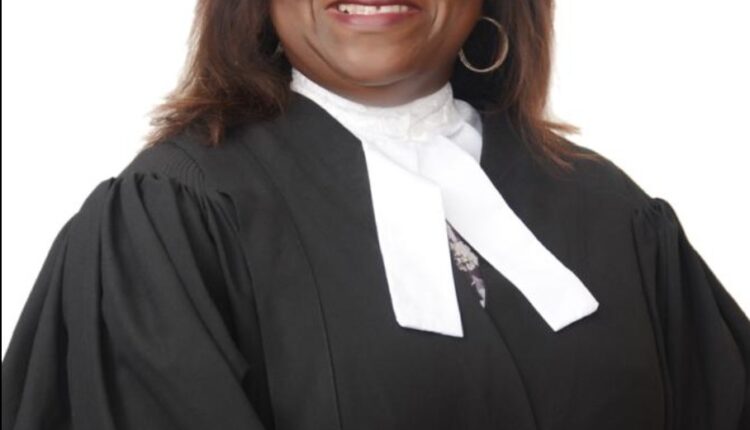Gloria Ofori-Boadu Makes A Significant Statement on the Future of Former Chief Justice Gertrude Torkornoo
Reinstatement of Chief Justice Gertrude – In a striking and strategic intervention, lawyer and women’s rights advocate Gloria Ofori-Boadu has made a significant statement on the future of former Chief Justice Gertrude Torkornoo.
By highlighting that the former CJ is “only 62” and has “8 years ahead of her,” Ofori-Boadu has shifted the public conversation from reflection on a concluded tenure to active speculation about a potential return. Consequently, this statement introduces a compelling narrative about the intersection of law, politics, and longevity in public service.

A Statement Rooted in Fact and Potential
Firstly, Ofori-Boadu’s comment is powerfully anchored in an undeniable factual reality: the mandatory retirement age for a Justice of the Superior Court of Judicature in Ghana is 70. Given that former Chief Justice Torkornoo is 62, she indeed has nearly a decade of eligible service remaining. This factual foundation transforms Ofori-Boadu’s remark from mere opinion into a credible political and legal forecast.
Furthermore, this observation immediately recontextualizes Torkornoo’s departure. Rather than being a final retirement, it can be viewed as a potential pause—an intermission in a distinguished career that could yet have another consequential act.
The Political Pathway to Reinstatement
The most provocative element of Ofori-Boadu’s statement is the explicit mention of reinstatement by a “next administration.” This directly injects the future of the judiciary into the ongoing political discourse. The process for appointing a Chief Justice is a presidential prerogative, subject to parliamentary approval.

Therefore, the possibility of a return hinges significantly on the outcome of future elections. A new administration with a different political alignment might look to appoint a known quantity who has already undergone rigorous parliamentary scrutiny. Alternatively, the same administration could have a change in strategic direction, potentially creating an opening.
Weighing the Precedent and Implications
However, the reinstatement of a former Chief Justice would be an extraordinary event without significant modern precedent in Ghana. Such a move would undoubtedly generate intense debate regarding judicial continuity versus renewal.
Torkornoo’s extensive experience supports reinstatement. Her modernization projects ensure stability. They also continue her reforms. Others argue reinstatement might stifle other qualified justices. It could also politicize the highest judicial office. Nevertheless, Ofori-Boadu boldly started this public conversation. It discusses how a nation best uses its esteemed legal minds.
A Champion for Women’s Leadership
Moreover, as a prominent women’s rights advocate, Gloria Ofori-Boadu’s statement carries an additional layer of significance. By advocating for the reinstatement of a highly accomplished woman, she subtly reinforces the importance of retaining female leadership at the very apex of power.
Torkornoo’s career itself is a landmark for women in the legal profession. Consequently, the discussion around her potential return also becomes a dialogue about the visibility and retention of women in leadership roles long after they have broken the initial glass ceiling.
Conclusion: A Future Full of Possibility
In conclusion, Gloria Ofori-Boadu has successfully reframed the narrative surrounding former Chief Justice Gertrude Torkornoo. What many saw as an endpoint is now being discussed as a potential hiatus. By focusing on the concrete facts of age and the fluid nature of politics, she has opened a fascinating discussion about the future of Ghana’s judiciary.
Chief Justice Torkornoo’s legacy will extend beyond her past accomplishments. This statement highlights her potential to contribute to the nation’s justice system in the future. Ultimately, whether reinstatement occurs or not, people will view her legacy through this broader lens.
Reinstatement of Chief Justice Gertrude



